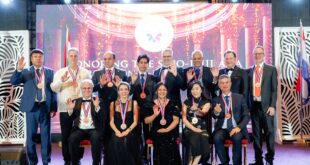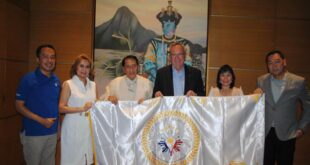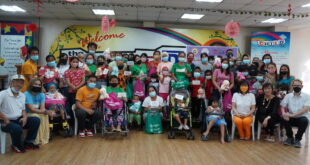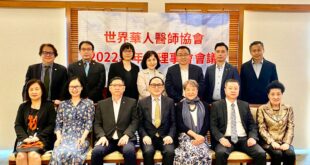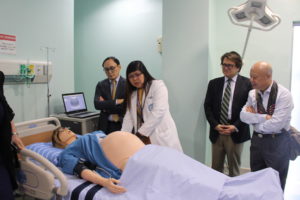
By Christopher Cottrell
Images: Christopher Cottrell
The Davao Medical School Foundation tour was a game-changer for the delegates of the 4th Sino Asia Pacific International Medical Forum and the 46th Sino Luso International Medical Forum.
Commented Dr. Manson Fok, President of the Sino Asia Pacific and Sino Luso International Medical Forums, “The students were highly motivated and professional. The simulation lab was state-of-the-art. I think when we get our medical school in Macao, we will collaborate with this institution. The open library, labs and testing methods were impressive. Everyone in our delegation from China, Australia and Europe were very excited about it.”
Dr. Fok added, “The business model here is absolutely humanitarian with students mainly coming from South Asia and enhancing the local programs. I am grateful that I sponsored this entire medical team to come to Macao so one day our medical school can learn from this and create a viable global business model that increases student performances and makes medical schools support the society and also independent industry together in one fell swoop.”
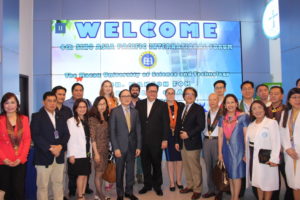
Dr. Billy Chan, Vice President of the Sino Asia Pacific and Sino Luso International Medical, as a pioneer of simulation training in medical education, was astounded when he visited the facilities of the Davao Medical School Foundation.
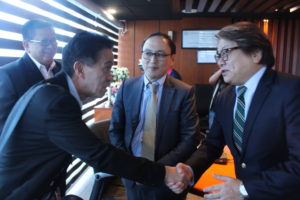
Dr. Chan explained, “We’ve been working really hard in the last eighteen to nineteen years in Australia. Of course in Macao at my university [Faculty of Health Sciences at Macau University of Science and Technology]we have a very good facility. But what I saw and what they’ve done in terms of the rotation of the rooms and sharing the control room, and sharing the rooms to make it an OSCE, and some of the rooms can be turned into a real live operation theatre and hospital ward and emergency ICU system, it is an amazing set up.”
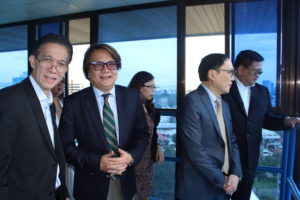
Dr. Chan continued, “I have not seen many facilities in Asia as such, even in Hong Kong or Singapore, and I’ve seen a lot of facilities. By judging what they have, and the amount of students that they train, and the professionals that they receive every week—I saw their timetable, probably Sunday is the only day that they don’t work in their particular set-up—basically they pack the place with their lecture theatre and facility. From what I heard, they have about 4,500 or so students. And they’re all embracing simulation as part of their training.”
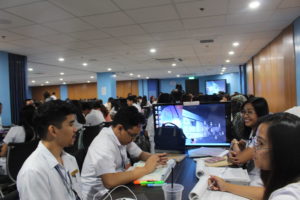
Dr. Chan further noted, “What I also saw was something quite interesting. They utilize technology to overcome a lot of those difficulties. For instance, the sheer numbers of students that they have, its a big school. There aren’t that many medical schools with this kind of student body, and the majority are overseas students. So they utilize innovations and technology to overcome those hurdles—with technology in lectures and information sharing, a digital library, open system of library with more like a coffee shop idea, so the young students are more to prone to learn in groups instead of individually.”
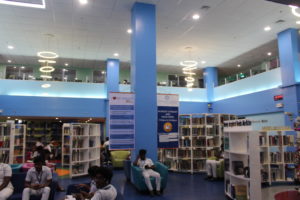
Dr. Chan added.”As you know in Macao, you see most of the students go to coffee shop and study. But their library, its almost like a coffee shop, in a bigger scale of course. They also took our group into a paperless examination center. They are given tests every two weeks without paper, with advanced technology. They use thumbprint and facial recognition so there’s no cheating. I haven’t seen any facilities like this, even in Europe. I certainly haven’t seen anything like this the United States or Australia. Its amazing and encouraging what I have seen here—the people are so innovative and so eager to learn. We’ll definitely have more collaboration with them once our own medical school opens, with more MOUs and exchanges with our faculties. This is very encouraging to see.”
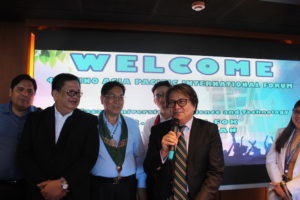
 Peace Post Asia Healthier News For The World
Peace Post Asia Healthier News For The World
